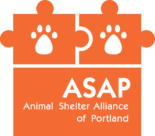The Covid-19 pandemic is forcing millions of pet owners in the Portland metro area and across the country to choose between caring for their pets and caring for themselves. If you are struggling financially, out of work, facing loss of or changes in housing, there are resources that may be able to help you provide for your pet and keep them with your family during this difficult time. The Animal Shelter Alliance of Portland (ASAP) is committed to assisting the community by supporting pet owners facing loss of housing and other economic hardships.
Pet Food Banks
The Pongo Fund: https://www.thepongofund.org/
- First time recipients have to register 7 days in advance in order to complete paperwork. Must bring government issued ID, address verification docs, food stamp docs if applicable
F.I.D.O. Pet Food Bank: http://fidoanimeals.org/post-2/
- Clients must submit an application to qualify for services: https://secureservercdn.net/198.71.233.104/58c.722.myftpupload.com/wp-content/uploads/2017/08/PetFoodBankApplication-Standard.pdf
MCAS: https://multcopets.org/news/emergency-pet-food-support
- Community members in need of pet food support may call the shelter’s main phone number, 503-988-7387, during call center hours (11 am – 5 pm on M,Tu,Th,F; 9 am – 4:30 pm on Sa, Su) to provide basic information about their circumstances, number and type of pets, and to set an appointment for food pickup.
CHOW: CHOW is a program for families in SW Washington in need of temporary assistance with pet food. Support is provided in once-monthly food distributions. Due to COVID-19 in our community, CHOW is no longer restricted to low-income families. Currently, CHOW is available to any family or individual in need of pet food assistance.
- To register for CHOW: Enrollment for CHOW should be completed via email. To enroll, please email [email protected] stating your need. A staff member will return your message as soon as possible.
Low-cost Vaccinations
Vetco: https://www.vetcoclinics.com/
- Vetco offers affordable, low cost vaccination services and preventative veterinary care during convenient evening and weekend hours.
Good Neighbor Vet: https://goodneighborvet.com/
- Mobile Veterinary Services in WA and OR. For a convenient and affordable alternative, we have multiple locations throughout the northwest providing low cost dog/cat pet vaccinations, parasite treatments and other limited mobile veterinary services.
Low-cost Spay/Neuter
For pet cats, visit the Animal Shelter Alliance of Portland’s Spay & Save program
For feral and “community” cats, visit the Feral Cat Coalition of Oregon.
Other Veterinary Assistance
CareCredit is a line of credit just for veterinary expenses. Learn more and apply here.
Dove Lewis Emergency Animal Hospital has some financial assistance available for emergency veterinary expenses for eligible pets. More information here.
RedRover Relief Urgent Care Grants provide one-time financial assistance to help pay for urgent veterinary treatments. Eligibility criteria and more information here.
The Portland Animal Welfare (PAW) Team provides veterinary services for the pets of people who are homeless, living in transitional housing, working with a referring agency or able to provide proof of income below the federal poverty line. Eligibility information available here.
ForeverPet Dental offers low-cost dental procedures and general veterinary services from locations in Beaverton and Vancouver. Details here.
Cat Adoption Team has a small fund available to provide one-time financial assistance for veterinary expenses for cats whose owners are struggling financially. Email [email protected] for more information.
Animal Aid Cares Fund works in partnership with veterinarians across Portland, offering each partner clinic the ability to submit one grant request per month, at their discretion, to cover veterinary costs up to $500. Details here.
The Pixie Care Clinic offers homeless and low income Portland residents access to vital veterinary care they can afford. Learn more about availability and services offered here.
Housing Assistance
Oregon:
Statewide Legal Protections for Tenants and updates on Eviction Moratorium:
https://www.oregoncat.org/legal-protections-for-tenants
Rental Assistance / Eviction Info:
https://covid19.211info.org/rental-assistance-/-eviction-info#countyrent
Washington:
Washington Low Income Housing Alliance:
https://www.wliha.org/resources/covid-19-resources
Northwest Fair Housing Alliance:
http://nwfairhouse.org/resources
Emotional Support Animals in Housing
An emotional support animal is not a pet. An emotional support animal is a companion animal that provides therapeutic benefit to an individual with a mental or psychiatric disability. The person seeking the emotional support animal must have a verifiable disability (the reason cannot just be a need for companionship). The animal is viewed as a “reasonable accommodation” under the Fair Housing Amendments Act of 1988 (FHA or FHAct) to those housing communities that have a “no pets” rule. Read here to understand more about the laws surrounding Emotional Support Animals and to see a sample letter. Knowing your rights to an Emotional Support Animal can help you and your pet(s) stay in your current rental home.
Emergency Pet Boarding – Clark & Skamania Counties
HSSW’s Safe Haven program provides emergency boarding assistance for families of Clark and Skamania counties. The program provides relief for families facing a temporary hardship or displacement due to domestic violence, emergency medical issues, and other urgent needs that prevent them from caring for their pet. Approval is dependent on available space and cannot be guaranteed. For more information or to request immediate boarding for qualified cases, contact: Community Program Team [email protected]
Finding Temporary Housing for Your Pet
Network:
Reach out to your circle of friends, family, and social networks such as Facebook and NextDoor to see who may be willing to provide temporary placement for your pet if needed. Sharing your pet’s profile (see below) with your network will help people decide if your pet would be a good match for their household. Keep a list of people who have offered to help and ensure you have up-to-date contact information for them. Ideally, follow up with a few questions such as for how long they may be willing to offer housing for your pet, and how much notice they require.
If you are unable to find someone in your personal network, try an online platform such as https://911fosterpets.com/ to identify others in your community willing to be a temporary guardian.
If you anticipate having to stay in a hotel or shelter with your pet temporarily, contact hotels and motels in the local area to check their policies on accepting pets and restrictions on number, size and species. Keep a list of “pet friendly” places, including phone numbers.
Pet Profile:
A pet profile can help if you need to quickly find a short-term foster home for your pet. Pet profiles can also be of help when moving into regular housing if the landlord is on the fence about allowing pets or wants more information about the pet you own. Write up a quick profile of your pet and include a picture. The profile should include your pet’s name, age, and a few sentences about your pet’s personality. Does your pet get along with other animals? Children? Does your pet have any behavior issues or quirks? Does your pet have special needs? Think of this write up as a short resume for your pet.
Preparing Pets for a Move
If you have a pet and are at risk of losing your housing in the coming months, there are things you can do now to help make sure you’ll be able to keep your pet, no matter what happens. Taking action early can make all the difference! These are also great steps for emergency preparedness in the event of a fire, earthquake, or other disaster.
Paperwork:
Many if not most landlords, temporary housing options such as motels or transitional housing, as well as all boarding facilities require pets to be up to date on vaccinations and preventive care such as flea treatment and dewormer. Getting your pet’s paperwork in order to ensure you have proof of any required vaccinations your pet has received is of the utmost importance. Make sure you have documentation of recent vaccinations, proof of spay/neuter if your pet has been altered, and that your pet’s license is up to date if required by your county. Ideally, prepare both an electronic file and a paper folder with all necessary paperwork for your pet, including name and contact information for your veterinarian and groomer (if applicable) and an emergency contact. If your pet has any chronic conditions (for example, diabetes) include this info as well. Having up to date paperwork on your pet is also important in the case of disaster or other emergencies.
Identification:
Make sure your pet is wearing proper and up-to-date identification in the form of a collar with an ID tag stating your pet’s name and at least one phone number, ideally two, to call should your pet be lost. If your pet is already microchipped, now is also a good time to contact the microchip company to ensure your contact information is still correct and up to date. If you are unsure which company your pet’s microchip is from, or don’t know your pet’s microchip number, your local veterinarian or animal shelter can scan your pet free of charge to retrieve the information.
Supplies:
Prepare a “go bag” with all supplies necessary to care for your pet, such as treats, collars, leashes, harnesses, litter boxes and litter, toys, dishes, brushes, bedding. Include everything your pet would need to adjust to new surroundings.
Containment:
Make sure you have a method of containment for your pet such as a crate for your dog or a carrier for your cat or other small animal, that allows them to be safely contained during travel or a move or as they adjust to new surroundings. Work on getting your pet comfortable with being contained by having the crate or carrier out where they can examine or sniff it and try throwing treats in the crate or feeding your pet meals inside the crate. An extra large dog kennel can be used for short-term housing for a cat during moves, with a litterbox, food/water, bed, and play area set up inside it. Kennels and carriers can be purchased new at pet supply stores and are also available pre-owned at thrift stores and via online resale venues like Craigslist, OfferUp, Facebook Marketplace, etc.
Resources:
Crate training your dog: https://www.oregonhumane.org/wp-content/uploads/2.4.17_Crate_Training_Your_Dog.pdf
Acclimation crate for cats: https://www.oregonhumane.org/wp-content/uploads/Your-New-Cat_Using-an-Acclimation-Crate.pdf

